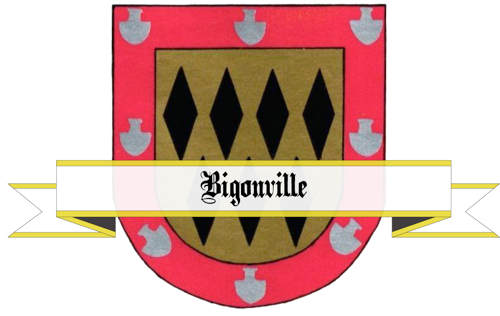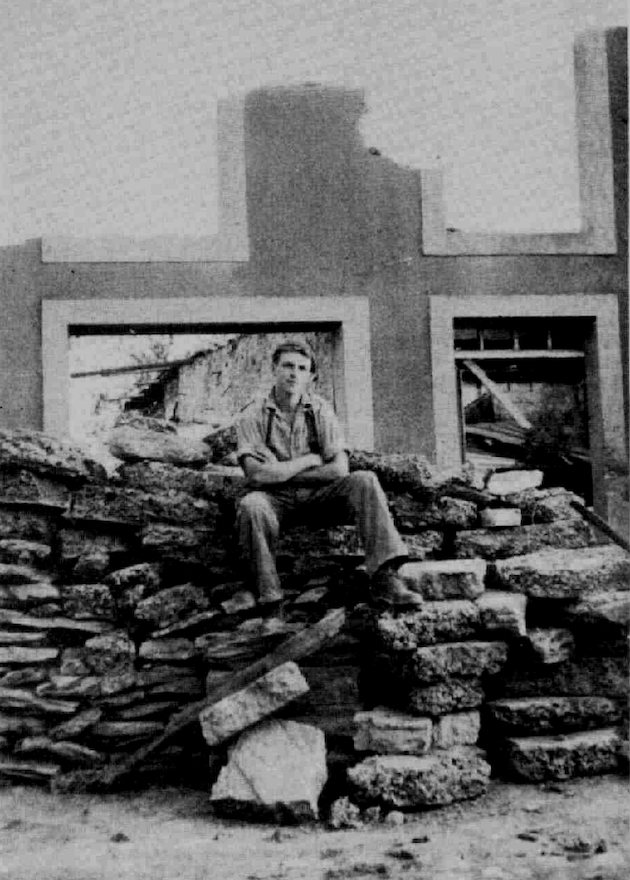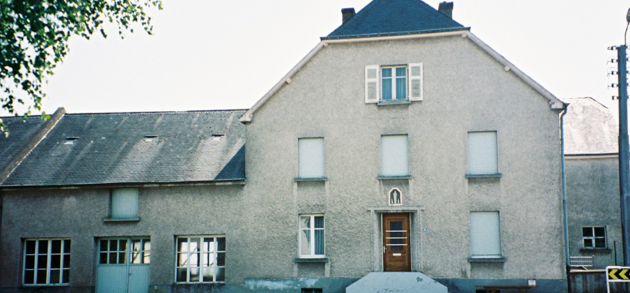Erinnerungen
Jos. Thomas damals 9 Jahre alt
Es war während der Runstedtoffensive im Dezember 1944, in Bondorf (Bigonville, Bungref). Von Flatzbour her drang das Kriegsgetümmel bis nach Bondorf herüber. Deutsche Soldaten hielten das Dorf besetzt, hatten in den Häusern verschanzt und hielten sich mit den Einwohnern in deren Keller auf. Es war nur natürlich, dass die Häuser von amerikanischer Artillerie beschossen wurden.
Am 22. Dezember flüchteten meine Eltern mit uns 3 Kindern erstmals in den Keller des Hauses “Mechels”, die 2 anderen waren in Bastogne in der Schule. Dieser Keller hatte ein festes Gewölbe, befand sich hinter dem langen Gebäude und war somit nicht dem direkten Beschuss ausgesetzt. Doch die Angst ging um im Keller.
Am 23. Dezember mussten wir, nach kurzem Aufenthalt in unserm Hause, wieder in den Keller, denn das Wetter hatte sich aufgeklärt und der grosse Kampf um Bondorf begann, die Schlacht von Bondorf, die am 25. Dezember, am Weihnachtsfest ihr Ende fand. Wir waren ungefähr 20-25 Personen im Mechels-Keller, Frauen, Männer, Kinder, Nachbarn und diejenigen, deren Häuser in Flammen standen. Die Angst war riesengross, denn ein 16 jähriger deutscher Soldat hatte sich in einem alten Nussbaum am Hause mit seinem Maschinengewehr versteckt und schoss wie wahnsinnig auf die Flieger, die bald dem Schabernak ein Ende machten, doch auch das Haus trafen. Das Gebäude erzitterte, eine Kapelle wurde zerstört, doch auch der junge Deutsche war nicht mehr. Wir aber beteten um unser Leben, auch diejenigen, die das Beten verlernt hatten, murmelten das Rosenkranzgebet mit und versuchten die Kinder zu beruhigen. Essen und Trinken war nicht bedeutend. In einer Feuerpause flüchteten wir aus Angst vor den Deutschen, die mit uns im Keller waren und gedroht hatten, uns mit nach Boulaide zu nehmen, in den Keller des Hauses Ries, wo auch 2 verwundete Amerikaner sich aufhielten.
Es war am Heiligen Abend, am 24.12.1944, als der letzte Kampf um Bondorf entbrannte. Panzer drangen in das noch von deutschen S.S. Soldaten besetzte Dorf, sie wollten Bondorf unter allen Umständen behalten. Es kam zu der grossen, furchtbaren Panzerstrassenschlacht, die das Dorf in ein Ruinenfeld und in eine wahre Flammenhölle verwandelte. Das Dorf war ein einziges Feuermeer, der Himmel war glutrot, in den Kellern zitterten die Menschen und in den Ställen verkohlte das Vieh elendiglich. Im Mechels-Keller hatten deutsche Soldaten sich versteckt. Die "Mechels-Joffer", Hausverwalterin im Mechelshause, berichtete den Amerikanern davon. Sie selbst ging mit, und forderte die Deutschen auf sich zu ergeben. Aus dem Keller heraus kam sie an der Spitze der Deutschen, die von den Amerikanern gefangen genommen wurden.
In unserm Keller wurde es ruhiger und w„hrend draussen der Kampf langsam zu Ende ging, schöpften die Menschen wieder Hoffnung und in dieser schrecklichen, heiligen Nacht erklang das Weihnachtliche "Minuit Chrétiens", das meine Mutter sang.
Unser Haus war zerstört, doch Vater und Mutter wollten es wieder aufbauen und versprachen über der Eingangstür eine Muttergottestatue anbringen zu lassen, als Dank für unsere Rettung.
Am Weihnachtstage waren wir ganz frei. Die Amerikaner blieben im Dorf und wir Kinder wurden von ihnen verwöhnt. Wir bekamen Schokolade, Kaugummi, ja Kleider, Stiefel und Esswaren. Wir hatten ja nichts mehr, doch die grosse Gefahr war vorbei. Dank den Amerikanern!
[Translation]
Memories
by Jos. Thomas, then 9 years old
It was during the Rundstedt offensive in December, 1944, that the tumult of war pushed through Flatzbour as far as Bigonville, Luxembourg. German soldiers had occupied the town, taken cover in the houses, and holed up with the occupants in their cellars. It was only natural that the houses were shelled by the American artillery.
On the 22nd of December, my parents fled first of all with three of us children into the cellar of the Mechels' house; the other two were in Bastogne in school. This cellar had a strong foundation wall, and was located behind the main house and therefore not exposed to direct fire. All the same, fear was everywhere in that cellar.
On the 23rd of December, after a brief visit to our own house, we had to go back into the cellar, since the weather had cleared up, and the real struggle for Bigonville had begun, - The Battle of Bigonville, - which only came to an end on December 25, Christmas Day. There were about twenty or thirty people in the Mechels' cellar, women, men, children, neighbors, and those whose houses were in flames. Fear was overpowering, for a 16-year-old German soldier had hidden himself with his machine gun in an old walnut tree by the house and was firing like a madman at the planes, which soon put an end to this farce, and even struck the house as well. The building shuddered, a chapel was destroyed, and also the young German was no more. We, on the other hand, prayed for our lives, and those people who had learned how to say their beads, muttered over their rosaries and tried to calm the children. During a lull in the shooting, we fled out of fear for the Germans who were with us in the cellar, and who had threatened to take us with them to the neighboring hamlet of Boulaide. This time we fled to the Ries house, where two wounded Americans were holed up.
It was on the day before Christmas, the 24th of December, that the final struggle for Bigonville broke out. Tanks pushed into the village, which was still occupied by German SS soldiers who wanted to hold Bigonville at all costs. (Translator's note: Actually they were troopers of the 5th Parachute Division.) It came down to a huge, frightful tank-battle in the streets which turned the town into a ruin and an utter flaming hell. The town was one big sea of fire, the sky was blood-red, the people trembled in the cellars, and in the barns the cattle burned to a crisp in agony. In the Mechels' cellar, German soldiers had hidden themselves. Mechel's sister-in-law, who was the housekeeper in the Mechels' house, informed the Americans about them. She herself went with them and ordered the Germans to surrender to her. Out of the cellar she came, leading the Germans who were taken prisoner by the Americans.
In our cellar it became quiet, and while outside the fighting slowly drew to a close, the people summoned up hope once more, and in this awful holy night sounded forth the Christmas carol "Minuit Chrétiens," which my mother sang.
Our own house was destroyed, but Father and Mother wanted to rebuild it, and promised to have a statue of the Madonna put up above the entrance door, out of gratitude for our salvation.
On Christmas Day we were completely free. The Americans remained in the village, and we chidren grew accustomed to them. We received chocolate, chewing gum, and even some clothes, boots, and something to eat. We had nothing left any more, but the great danger was past. Thanks be to the Americans!


